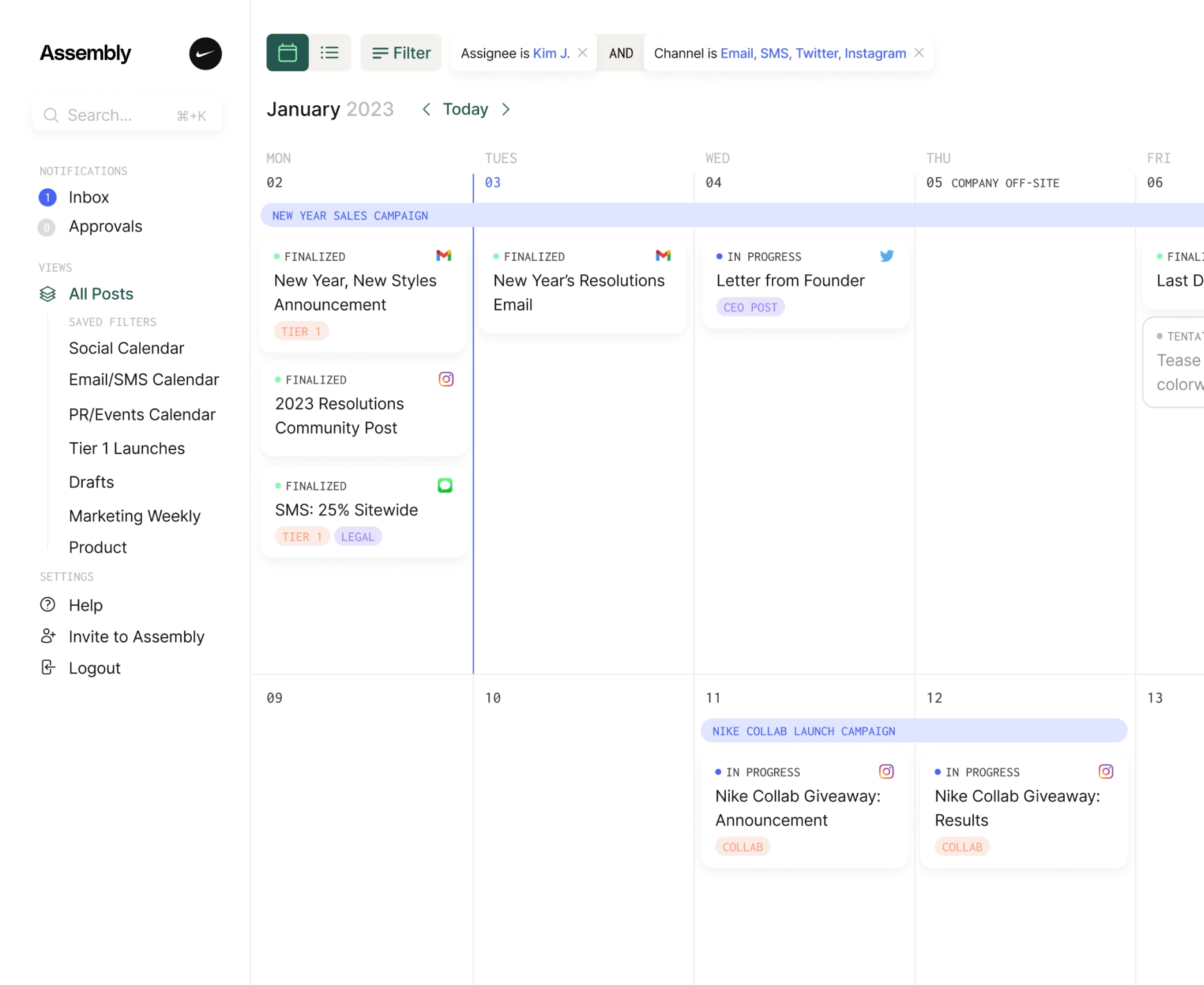
Recruitment Marketing 101: Using Social Content to Attract Talent as a Startup

In the make-or-break early days of a startup, nailing your recruitment strategy is paramount. But attracting top talent requires more than just posting job descriptions - it calls for a creative, high-impact content marketing approach.
We sat down with John Kim, co-founder of the recruiting marketplace Paraform, to learn his secrets for using content to efficiently identify, engage, and hire amazing teams from day one. Paraform is trusted by leading startups like and more - and they are power users of Assembly's content marketing tools.
How should companies think about utilizing LinkedIn or content to get the word out about jobs?
There's this term called recruiting marketing. From what I've seen, companies that do that really well create enough noise that people look at it, right? A lot of Series A or Series B companies, for example, get all their team members to share it in a fun way. Not just like, "Hey, we're hiring 10 engineers, join my team," with a link. There's always a bit of creativity involved.
I've seen a company, I think it was called CommandBar, highlight how they hired their founding engineer or their first operator when they were recruiting. That story became interesting enough to go viral and people shared it. Pocus is actually one of our customers as well; they do content pretty well. I like how they approach it, getting each person who joins the company to reflect on their first year and things like that, and then saying “Hey, by the way, we’re hiring”.
So, getting more creative with it, not just sharing for the sake of it. Good examples of these creative solutions would be highlighting how you've already hired great people, getting your team to share their own stories of joining, rather than just listing perks or talking about funding and investors, which can be a bit tacky because everyone can say that. It's more about the fundamentals and who else you'll be working with. If you spread that message a lot , I think that would be good recruiting.
Any companies or founders that you often reference or follow for inspiration?
On LinkedIn or Twitter, there's a company called Antimetal. I've noticed they do a lot of unconventional things. It's not just traditional blogs and sharing them, but they think outside the box. I remember seeing something they did called "slice as a service," and it’s like a SaaS thing. They started delivering pizzas to their friends at startups or places like Sequoia. And I think it created a lot of noise. And I'm sure Antimetal's product is one of those things that is broad enough where if they hit enough people and just funnel them into their website, people will book demos. So I think it's smart, like because that's how they do top of funnel, I think it's smart to just go to the numbers.
So I think I talked about this company already, but Pocus, I think the founder and a few people on their team do content really well. They're pushing this notion of product-led growth, not just through cold emails or spam, but by intentionally growing based on signals from how people use their product. They write blogs, host podcasts or webinars, often partnering with industry leaders in that space. I think they did one with someone at Ramp, and they did one with someone at Amplitude, and they repurposed that one interaction with those guests, because it’s hard to get those guests, right? And they repurposed that into blogs, and then they turned that into videos, and then they also turned that into webinar links. They also do well in terms of distributing that. I sometimes get emails, but I see contents that are well-scheduled on LinkedIn that just sort of get to you at the right time. Like obviously we're not at the stage of buying their product yet. We're like more early, but that sort of reminds me, when we do need this, we should talk to these guys. So I think they do the distribution of their content really well.
How do you plan out what content you'll be posting? Do you use a content calendar?
Yeah, yeah, for sure. So for the content calendar, we do use one. We use Assembly for that. When we plan content, I think about a lot of things, but it always goes back to what we are trying to do as a company, not just get numbers. Of course, we have two sides of the marketplace. We have recruiters, and we have companies that are hiring. So depending on what we are aiming to do, we also think on a weekly basis. That’s why content calendars and content management is so important for early stage companies, because it’s not like you plan out the year, right? It's like every week things change. So you need to be able to dynamically allocate things and plan very well.
So for example, if we're focusing on recruiters, I think a lot of recruiters resonate with other successful recruiters on the marketplace. So what we would do is we would plan out the content calendar in a way where, okay, first we need to talk to that recruiter who made the hire on the platform and made money. And then we need to turn that into a blog piece. And then from that, we need to turn that into a LinkedIn post and somehow have that very well organized. So we would plan using the content calendar, you know, for example, like, on this day we would post. So like working backwards and how, when do we need to meet the recruiter? And if you have a lot of recruiters making money on our platform, which is the case, sometimes it gets hard to organize that. So that's where I think content, like organizing content, scheduling, using calendars, like Assembly, is superb.
You work with a lot of similarly sized companies that we've seen at Assembly, so there's a similar Ideal Customer Profile (ICP). Hiring is honestly top of mind for most companies, so it's really intriguing.
Yeah. I think something I talk about with other founder friends and stuff is that a lot of studies or existing knowledge show that, there's reasons for why companies are successful. And if you look at the top reasons, I think the number one thing people usually say is luck and timing. And then the number two thing is team. And then there's like funding and like a few others. There's a TED talk about this. And if you look at the number one reason, which is timing, it's largely luck, right? It's, I would say sometimes out of your control.
And then the second and most important thing being, team, in that study, that's 100% within your control, right? I think, then you can otherwise understand that out of the things you can control, the most important thing you can do to make a successful, build a successful company is recruiting. Like ,”What team are you building?” And I think people ask Steve Jobs too, right? “What is the greatest product you've built?” And people were thinking maybe the Mac, maybe the iPhone, but he was like, you know, “My team”.
And that has resonated with me a lot. So when I think about recruiting, yeah, it is the number one most important thing a company should always think about. And it's not, you know, a lot of people underestimate how long it takes and how much effort it takes to recruit good people. So front-loading that expectation and work and just thinking about it a lot always helps. And there's always that term, “always be recruiting”, right?
Especially when I link this to our growth strategy, we do a lot of content, but also outbound, right? Because we're pretty sales-driven in our go-to-market approach. So when I think about who's hiring, what are some signals? Maybe they posted a job, raised money, or hired a new recruiter—whatever those things are. It's still hard to tell whether they'll want to use our product just on the surface.
Initially, I mentioned how the challenge of hiring is vague, but when you break it down, there are multiple reasons why people buy recruiting products and invest in them. I concluded that it's always about timing. Think about which cold emails you open or what content you consume and stop to read. People say copy and strategy are important, but ultimately, I think the most crucial factor is how pressing it is at that time.
In order to get timing right at scale, you need some distribution through content and volume when it comes to outbound. Our strategy intentionally keeps the top of the funnel more open. It might differ from some enterprise SaaS, which tends to be more personalized. It’s hard to predict these signals and there’s so many random reasons why someone might try our product, we keep it open. That's why content distribution and outbound is so important to think about.
Since I’m the type of person to only open cold emails when it’s actually relevant to me, I think reaching enough volume when there’s enough people that it is top of mind, I think really worked for us. Instead of thinking too much about, “What is that exact subject line?”, “What is that open conversion rate?” We can optimize more for how we get to a lot of people. That’s something interesting when it comes to building a recruiting product or business when it comes to go-to-market.
Ready to start growing on social media?
Assembly is an end-to-end social media management tool. Join 500+ marketers and agencies who have made the switch.






